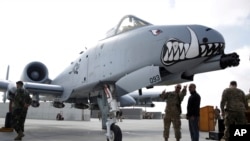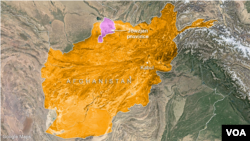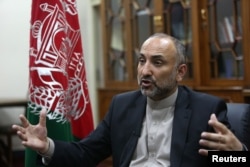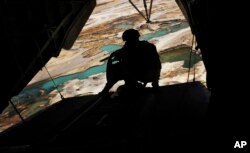The U.S. military said Monday it carried out an airstrike that killed the northern commander of the Islamic State group's Afghan affiliate.
U.S. Forces-Afghanistan said the strike Thursday in Faryab province killed Qari Hekmatullah and his bodyguard.
Afghan military officials had confirmed Hekmatullah's death on Saturday, saying it happened in a strike in neighboring Jowzjan Province, an area effectively controlled by IS.
The U.S. military is lending more muscle to the fights to root out Islamic State in northern Afghanistan and to convince Taliban insurgents to the south and west to end their differences by coming to the negotiating table.
Buried nearby
Provincial governor Maulvi Latifullah told VOA that after the airstrike, the two were buried in the middle of the night in a nearby village and a few members of the group attended their funeral.
A spokesperson with U.S. Forces-Afghanistan said operations in the area are heating up.
"We are conducting a series of intensive operations in Jowzjan and across all of northern Afghanistan to defeat IS-K," U.S. Forces-Afghanistan spokeswoman Colonel Lisa Garcia told VOA.
Hekmatullah, formerly a member of the Taliban who helped to found IS in Afghanistan, is just the latest high-ranking IS-Khorasan commander to have been killed as part of counterterror operations in the country.
IS-Khorasan leader Abu Sayed was killed in a U.S. airstrike in July 2017 in Kunar province.
Sayed had taken over from the previous emir, Abdul Hasib, who died in April 2017 following what U.S. officials described as a brutal, three-hour firefight in Afghanistan's Nangarhar province.
At the time, top U.S. military officials expressed confidence the fight against IS in Afghanistan was going "in the right direction." But since then, some Afghan officials have expressed growing concerns.
This past December, Afghan officials told VOA that IS had as many as 3,000 foreign fighters in the country, many of them coming from Pakistan and Uzbekistan.
Surge in jihadists
More recently, Afghan National Security Adviser Mohammad Hanif Atmar said those numbers had been bolstered by a new surge of jihadists, many coming to Afghanistan from places like Iraq and Syria.
"We're talking about hundreds of them coming from the Middle East through Pakistan, and other regional groups," Atmar said.
The intensified campaign against IS, and Hekmatullah's death, came amid growing Russian allegations that the U.S. is not doing enough to prevent IS from establishing a bigger foothold in northern regions that border on Central Asian states.
U.S. officials have countered that Russia's influence has done more to destabilize Afghanistan, accusing Moscow of providing weapons and other support to the Taliban. Russia denies those charges.
In the meantime, the U.S. is expanding efforts to cut off the Taliban's access to funding.
U.S. military officials said Saturday that they had carried out a series of precision airstrikes April 3-5 against 11 Taliban narcotics production facilities in Afghanistan's Farah and Nimroz provinces.
U.S. Forces-Afghanistan said in a statement that the strikes, using fighter-bombers, ground attack planes and drones, were the first counternarcotics strikes outside southern Helmand province.
"The Taliban will have no safe havens," said Major General James Hecker, the commander of the 9th Air and Space Expeditionary Task Force-Afghanistan.
"They have become a criminal organization that profits from selling drugs and using those funds to conduct operations that maim and kill Afghans," Hecker said. "By cutting off the Taliban's economic lifelines, we also reduce their ability to continue these terrorist activities."
The U.S. says it has carried out 75 strikes targeting drug production facilities since November 2017, damaging facilities that had helped generate about $200 million in profits for the Taliban.
Hecker said the expanded strikes should send a message to Taliban leaders.
"The only way they can have a peaceful solution is to sit down and reconcile with the National Unity Government," he said.







